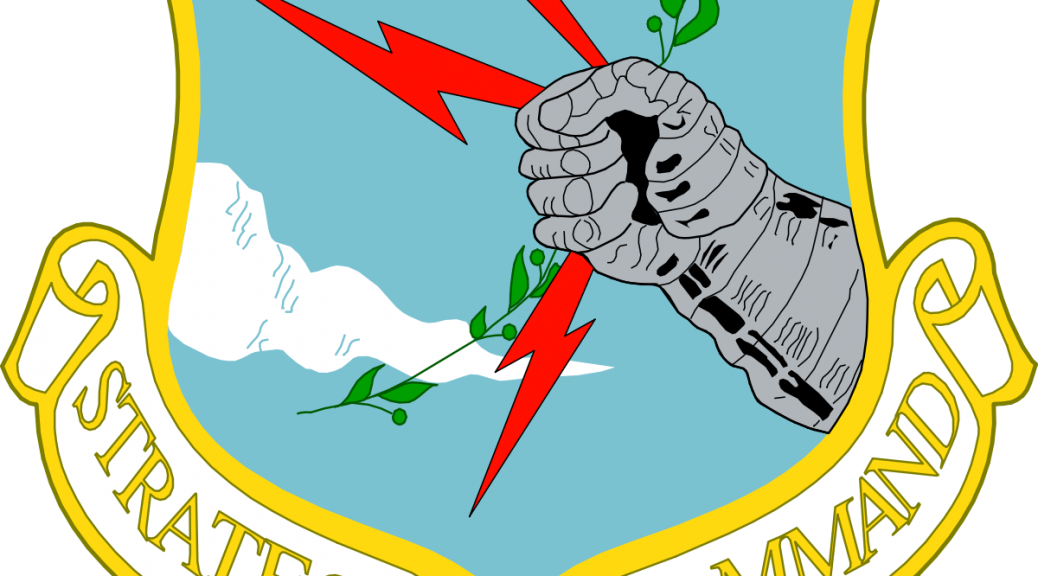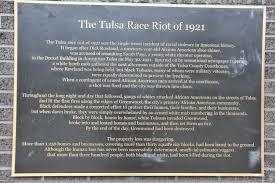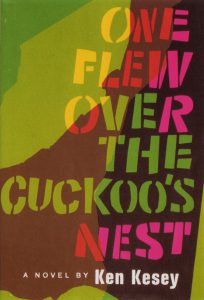June 1 Peace Love Art Activism
Native Americans
The Treaty of Bosque Redondo
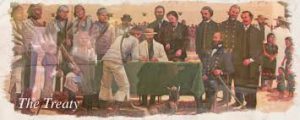
June 1, 1868: the Treaty of Bosque Redondo between the United States and many of the Navajo leaders was concluded at Fort Sumner, New Mexico. Some of the provisions included establishing a reservation, restrictions on raiding, a resident Indian Agent and agency, compulsory education for children, the supply of seeds, agricultural implements and other provisions, rights of the Navajos to be protected, establishment of railroads and forts, compensation to tribal members, and arrangements for the return of Navajos to the reservation established by the treaty. The Navajo agreed for ten years to send their children to school and the U.S. government agreed to establish schools with teachers for every thirty Navajo children. The U.S. government also promised for ten years to make annual deliveries of things the Navajos could not make for themselves. [Bosque Redondo memorial article] (see June 18)
June 1 Peace Love Art Activism
BLACK HISTORY
Tulsa Race Riot
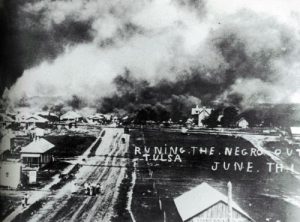
May 31 and June 1, 1921: The Tulsa Race Riot was a large-scale racially motivated conflict in which whites attacked the Tulsa, Oklahoma black community of the Greenwood District, also known as ‘the Black Wall Street’ and the wealthiest African-American community in the United States. Whites burned it to the ground.
During the 16 hours of the assault, over 800 people were admitted to local hospitals with injuries, and more than 6,000 Greenwood residents were arrested and detained. An estimated 10,000 blacks were left homeless, and 35 city blocks composed of 1,256 residences were destroyed by fire. (next BH, see Oct 5; next RR, see March 19, 1935; next lynching, see Oct 20; additional Tulsa, see February 21, 2001)
Alabama’s NAACP ban overturned
June 1, 1964: the U.S. Supreme Court unanimously overturned Alabama’s ban on the NAACP, allowing the NAACP to operate in the state for the first time since 1956. [King Institute article] (see June 7)
Death Penalty
June 1, 1965: NY Gov Nelson Rockefeller signed the abolition of death penalty bill. [Death Penalty Info article] (BH & DP, see June 2; see Whitmore for expanded story)
Rodney King
June 1, 1994: King awarded nothing in punitive damages in a civil trial against the police officers. He had asked for $15 million. [NYT article] (King, see April 2012)
Stand Your Ground/George Zimmerman
June 1, 2012: Seminole County Circuit Court judge, Kenneth R. Lester Jr., revoked George Zimmerman’s bond during a hearing on Friday and gave him 48 hours to surrender. In revoking the bond, Judge Lester found that Zimmerman had misled the court about his finances, with the help of his wife, during his April bond hearing. (see June 3)
Nelson Mandela
June 1, 2004: Mandela said he would severely reduce his public activities so he could spend his remaining years resting and writing. A month shy of 86, he was increasingly frail and had trouble walking. (see Mandela for expanded chronology)
June 1 Peace Love Art Activism
KKK TERRORISM
June 1, 1925: on November 7, 1922, the voters of Oregon approved a Ku Klux Klan-sponsored referendum that amended the state’s compulsory education law to eliminate an exception for private schools. The law required children between the ages of 8 and 16 to attend public schools. Both the intent and the effect of the law was to shut down private parochial schools, particularly Roman Catholic schools, in the state.
In Pierce v. Society of Sisters, decided on this day, the Supreme Court declared the law unconstitutional because it interfered with the right of parents to control the education of their children. (see Aug 8)
June 1 Peace Love Art Activism
Judicial Milestone
June 1, 1942: the case involved a man whom Maryland had denied counsel though he could not afford one and was forced to represent himself.
Previously, in Johnson v. Zerbst [decided May 23, 1938] the Supreme Court had held that defendants in federal courts had a right to counsel guaranteed by the Sixth Amendment. In Powell v. Alabama [decided November 7, 1932, Scottsboro Nine case], the Court had held that state defendants in capital cases were entitled to counsel, even when they could not afford it; however, the right to an attorney in trials in the states was not yet obligatory in all cases as it was in federal courts under Johnson v. Zerbst.
In Betts v. Brady, Betts was indicted for robbery and upon his request for counsel, the trial judge refused, forcing Betts to represent himself. He was convicted of robbery, a conviction he eventually appealed to the Supreme Court on the basis that he was being held unlawfully because he had been denied counsel.
Betts filed writ of habeas corpus at the Circuit Court for Washington County, Maryland claiming he had been denied counsel and then filed a writ to Court of Appeals of Maryland. His petitions were all denied and he finally filed for certiorari to the Supreme Court. In a six to three decision, the Court found that Betts did not have the right to be appointed counsel [Oyez article] (see May 3, 1954)
June 1 Peace Love Art Activism
McCarthyism
June 1, 1950: seven Republican Senators denounced and repudiated the tactics of Joe McCarthy, their party colleague, in his campaign to try to prove Communist penetration of the State Department. The Senators issued a “Declaration of Conscience” that accused “certain elements” of a design for “riding the Republican party to victory through the selfish political exploitation of fear, bigotry, ignorance, and intolerance.” The group also criticized President Truman for a lack of leadership. [Senate dot gov article] (see June 17, 1950)
June 1 Peace Love Art Activism
FM stereo
June 1, 1961: regular FM stereo radio broadcasting with a multiplexed signal began in the U.S. In Schenectady, NY, WGFM (owned by G.E.) was first on the air, at 12:01 a.m. Eastern time. Zenith’s WEFM in Chicago, IL, followed and KMLA in Los Angeles, CA. The Federal Communications Commission (FCC) approval specified the starting day. Field tests for stereo FM had begun in Mar 1959 to evaluate various competing systems. (see “in July 1964”)
Jimi Hendrix
June 1, 1962: supply officer Lyndon D Williams filed a report against Hendrix for lack of interest and inability to concentrate. (see Hendrix military for expanded chronology)
It’s My Party
June 1 – 14, 1963, “It’s My Party” by Leslie Gore #1 on the Billboard Hot 100.
Let’s Get Together
June 1, 1964: The Kingston Trio released their album Back In Town. On the album was their version of “Let’s Get Together.” This version was the first to bring the song to the attention of the general public. Dino Valenti wrote the song which would later become well known when sung by the Youngbloods in 1967. (see Nov 1)
June 1, 1967: Beatles released “Sgt. Pepper’s Lonely Hearts Club Band” released simultaneously in UK and US. It became a cultural benchmark and won the Grammy for “Album Of The Year”, the first rock record given that award. (see June 4)
- Label: Parlophone (UK), Capitol (US)
- Recorded: 6 December 1966 – 21 April 1967, EMI and Regent Sound studios, London
Mrs Robinson
June 1 – June 21, 1968: “Mrs Robinson” by Simon and Garfunkel #1 on the Billboard Hot 100.
Give Peace a Chance
June 1, 1969: John and Yoko recorded “Give Peace a Chance” during their Bed-In. The recording session was attended by dozens of journalists and various celebrities, including Timothy Leary, Rabbi Abraham Feinberg, Joseph Schwartz, Allan Rock, Rosemary Woodruff Leary, Petula Clark, Dick Gregory, Allen Ginsberg, Murray the K and Derek Taylor, many of whom are mentioned in the lyrics. Lennon played acoustic guitar and was joined by Tommy Smothers of the Smothers Brothers, also on acoustic guitar. (Beatles, see June 13; Lennon, see July 1; Vietnam, see June 5)
June 1 Peace Love Art Activism
US Labor History
United Farm Workers
June 1, 1966: farm workers under the banner of the new United Farm Workers Organizing Committee strike at Texas’s La Casita Farms, demand $1.25 as a minimum hourly wage. (see June 20)
Abercrombie & Fitch
June 1, 2015: the Supreme Court ruled 8-1 that retailer Abercrombie & Fitch may have violated workplace discrimination law when it turned down a Muslim job applicant because she wore a hijab, even though her religious beliefs never came up in the interview.
Samantha Elauf, the job seeker at the center of the case, applied for a sales position at an Abercrombie children’s store in Oklahoma in 2008. Despite her high marks in the interview, Elauf didn’t land the job because her headscarf ran afoul of Abercrombie’s employee “look policy,” which bars hats and promotes the retailer’s preppy brand. Elauf sued with the help of the U.S. Equal Employment Opportunity Commission.
Civil rights law required that employers accommodate workers’ religious beliefs in the workplace, and forbid them from firing or not hiring someone because of those beliefs. But Abercrombie argued that it couldn’t have known to make such an accommodation because Elauf, who was 17 at the time, never requested one. [NYT article] (see Aug 17)
June 1 Peace Love Art Activism
Cultural Milestone
CNN
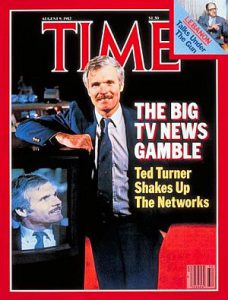
June 1, 1980: CNN (Cable News Network), the world’s first 24-hour television news network, made its debut. The network signed on at 6 p.m. EST from its headquarters in Atlanta, Georgia, with a lead story about the attempted assassination of civil rights leader Vernon Jordan. CNN went on to change the notion that news could only be reported at fixed times throughout the day. At the time of CNN’s launch, TV news was dominated by three major networks–ABC, CBS and NBC–and their nightly 30-minute broadcasts. [National Geographic article] (see March 6, 1981)
June 1 Peace Love Art Activism
Nuclear/Chemical News
Bush/Gorbachev
June 1, 1990: U.S. President George H. W. Bush and Soviet Union leader Mikhail Gorbachev signed a treaty to end chemical weapon production and begin destroying their respective stocks. [Politico article] (see January 26, 1992)
North Korea
June 1, 2018: eight days after abruptly canceling the June 12 meeting citing North Korea’s “open hostility,” Trump just as abruptly announced that it was back on, the latest head-spinning twist in a diplomatic drama that has captivated and confused much of the world. After complaining of North Korean bad faith, he said, in effect, never mind.
“We’re over that, totally over that, and now we’re going to deal and we’re going to really start a process,” Mr. Trump told reporters after meeting at the White House with a high-ranking North Korean envoy who delivered a personal letter from Mr. Kim. “We’re meeting with the chairman on June 12, and I think it’s probably going to be a very successful — ultimately, a successful process.” (see June 12)
June 1 Peace Love Art Activism
CLINTON IMPEACHMENT
June 1, 1998: Clinton’s defense team decides to drop the appeal on the executive privilege ruling. But his lawyers will continue to argue for attorney-client privilege to prevent close friend and aide Bruce Lindsey from answering all of Ken Starr’s questions. (see Clinton for expanded story)
June 1 Peace Love Art Activism
Oklahoma City Explosion
June 1, 2004: the penalty phase of Terry Nichols trial began. The jury could not reach a unanimous decision on the death penalty. Judge Taylor called Nichols a terrorist and said “No American citizen has ever brought this kind of devastation; you are in U.S. history the No. 1 mass murderer in all of U.S. history” and sentenced Nichols to 161 consecutive life terms without the possibility of parole. Nichols was returned to the federal prison in Colorado. (see May 26, 2004)
June 1 Peace Love Art Activism
Jack Kevorkian
June 1, 2007: paroled for good behavior. He had spent eight years and two and a half months in prison. (see JK for expanded story)
June 1 Peace Love Art Activism
June 1, 2010: oil began washing up on the beaches of Gulf Islands National Seashore. (see June 5)
June 1 Peace Love Art Activism
Immigration History
Luis Ramirez
June 1, 2011: Matthew Nestor, the former police chief of Shenandoah, PA, who convicted of impeding a federal investigation into the beating death of Luis Ramirez was sentenced to 13 months in prison, a lower-than-expected term.
Judge A. Richard Caputo of Federal District Court in Wilkes-Barre, Pa., said the sentencing guidelines were too harsh for Nestor. A presentencing report by probation officials had recommended 57 to 71 months. Another officer, William Moyer, a lieutenant who was convicted of lying to federal investigators, was sentenced to three months. (IH, see June 2; see Ramirez for expanded story)
June 1 Peace Love Art Activism
June 1, 2012: the government dropped one of the murder charges against Bales, because one victim had been double counted. Simultaneously, other charges were filed including abuse of steroids, alcohol consumption, and attempting to destroy evidence. Assault charges were increased from six to seven. (see May 29, 2013)
June 1 Peace Love Art Activism
Cannabis
June 1, 2015: Texas Gov. Greg Abbott signed a bill legalizing the limited use of marijuana extracts for severe forms of epilepsy. The law allowed the use of cannabis oils that are high in CBD, or cannabidiol, a non-euphoric compound found in the marijuana plant, and low in THC — the main psychoactive ingredient found in marijuana associated with the “high” sensation — to treat intractable epilepsy. (see June 15) or see CCC for expanded cannabis chronology)
June 1 Peace Love Art Activism
FREE SPEECH
Elonis v. United States
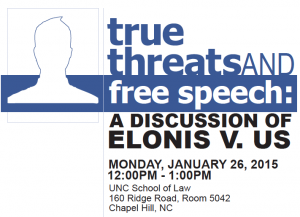
June 1, 2015: the US Supreme Court, in a 7 – 2 ruling, reversed a lower court’s judgment against Anthony Elonis who posted violent messages on Facebook. The Court steered clear of discussing when exactly protected speech becomes an unprotected threat.
Elonis was previously found guilty of four counts of transmitting threats. After his wife left him, Elonis wrote a series of Facebook posts fantasizing about killing her and others. He claimed that the posts, made in the style of free-form rap lyrics, were therapeutic and a form of constitutionally protected free speech, pointing to similar wife-killing fantasies by performer Eminem. His estranged wife, however, said she was afraid for her life after seeing them, going as far as to get a restraining order. A post about shooting children at an elementary school, then one about killing an FBI agent who questioned him about it, also ended up on the list of charges.
Elonis argued that unless he intended to threaten his wife or anyone else with the posts, they couldn’t be taken as “true” threats. Prosecutors, though, said that intent shouldn’t matter — the real test was whether a “reasonable person” would find them threatening. While the Third Circuit federal court agreed with the “reasonable person” test, the Supreme Court now said that’s not enough. In a majority opinion, Chief Justice John Roberts said that the law must consider someone’s mental state when deciding threat cases. [US Courts article] (see June 18)
June 1 Peace Love Art Activism
Environmental Issues/June 1, 2017
Paris climate accord
June 1, 2017: President Trump announced that he would withdraw the United States from participation in the Paris climate accord, weakening global efforts to combat climate change and siding with conservatives who argued that the landmark 2015 agreement was harming the economy. He would stick to the withdrawal process laid out in the Paris agreement, which President Barack Obama joined and most of the world had already ratified. That could take nearly four years to complete, meaning a final decision would be up to the American voters in the next presidential election. [NYT article] (next climate accord, see November 4, 2019)
Michael Bloomberg
June 1, 2017: Bloomberg founder and CEO Michael Bloomberg offered to make up the $15 million in funding that the United Nations stood to lose from President Trump’s decision to pull out of the Paris Climate Agreement.
Under the agreement, the U.S. would have been expected to contribute that amount to the operating budget of the United Nations Framework Convention on Climate Change, the accord’s coordinating agency.
“Americans are not walking away from the Paris Climate Agreement,” the billionaire philanthropist and former New York City mayor said. “Just the opposite — we are forging ahead.” (see June 2)
Arctic National Wildlife Refuge
June 1, 2021: the Biden administration said it would suspend oil drilling leases in the Arctic National Wildlife Refuge that were issued in the waning days of the Trump presidency.
The decision could ultimately end any plans to drill in one of the largest tracts of untouched wilderness in the United States, delicate tundra that is home to migrating waterfowl, caribou and polar bears. Democrats and Republicans have fought over whether to allow oil and gas drilling there for more than four decades, and issuing the leases was a signature achievement of the Trump White House.
Interior Secretary Deb Haaland on Tuesday published a secretarial order formally suspending the leases until the agency has completed an environmental analysis of their impact and a legal review of the Trump administration’s decision to grant them. [NYT article] (next EI, see June 7)
June 1 Peace Love Art Activism
Fair Housing
June 1, 2021: President Biden announced:
- The creation of a new interagency initiative to address inequity in home appraisals, led by Secretary of Housing and Urban Development Marcia Fudge. “Homes and majority Black neighborhoods are often valued at tens of thousands of dollars less than comparable homes in similar, majority white communities,” said White House officials. “This effort will seek to utilize, very quickly, the many levers at the federal government’s disposal…to root out discrimination in the appraisal and home buying process.”
- HUD will issue two Fair Housing Act rules that reverse efforts made by HUD during the Trump administration to weaken protections afforded by the law. “In both cases, HUD is moving to return to traditional interpretations of the Fair Housing Act,” officials said Monday. The new rules are intended to “clear the way for HUD to more vigorously enforce the Fair Housing Act,” they said. [CNBC article] (next FH, see Oct 22)
June 1 Peace Love Art Activism

